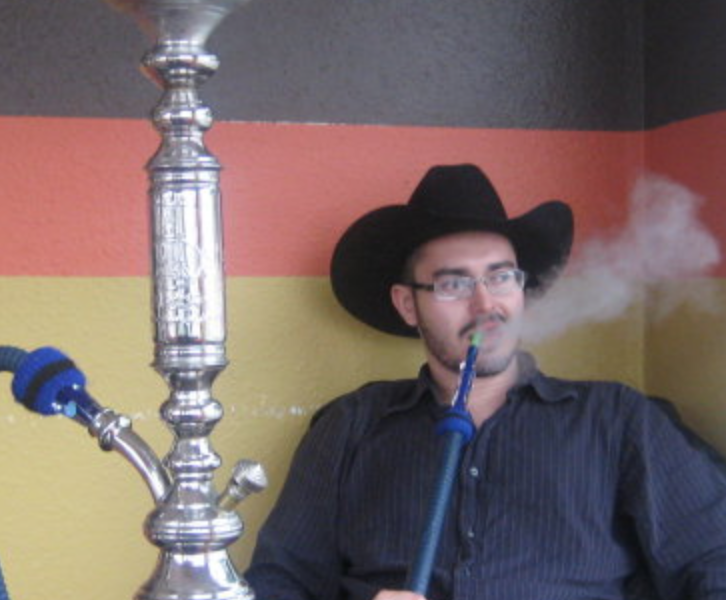

Today we’d like to introduce you to Khalid Hussein.
Khalid, please share your story with us. How did you get to where you are today?
I came to Los Angeles in 2004 to study art at UCLA. I stayed on for a Master’s degree. They were important and formative years. Coming from a mixed-race family, I had grown up mostly in the middle east but attended high school in Monterey county. I was lucky enough to have amazing mentors in the central coast area. I worked for an art curator and was a member of the Youth Arts Collective (YAC), an after school art studio for students, with which I still participate today in fundraisers. These people taught me valuable skills and life lessons that have proved invaluable throughout my career. I’ve been in LA since college, which I think by now qualifies me to call myself an Angeleno. After graduating, I freelanced for a few years, designing t-shirts for an up and coming business and doing other illustration jobs.
My good friend and colleague, Nate Geare, and I also co-managed a space in Palm Springs (Renegade Art Gallery), which saw a fair amount of success before having to close its doors. I went on to direct a pop-up space called Departures Gallery near LAX. The gallery business is tough work, and it is not easy to make a profit large enough to sustain a long term existence, but we made the best out of our limited resources and brought in a number of artists to show their work. Overall, whether a business like that is profitable in the long term was not the most important point. We gathered artists and shared in the venture and opportunity to shine. I have had the privilege to show in a number of galleries and museums in southern California, Northern California, and Arizona.
At the same time, I worked with SPARC in Venice to restore murals throughout the LA area. Mural work got me over my fear of heights. I went back up to Monterey to paint a mural as well. Somewhere along the way, I managed to produce two non-fiction graphic novels. Publication was an unknown game to me, and I wound up self-publishing them in a limited form. Nevertheless, I have received requests from college students, asking how to cite a self-published book, so I guess my work has managed to get around. Somewhere along the line, I shot some short films. To supplement my freelance life, I have often worked at art supply stores and teach private painting lessons. These side endeavors have actually led me to meet a number of brilliant artists and friends. For me, the point has always been to make meaning through art, not for money, but for the love of the game. Anything else I do is to support the creative mission of my life.
We’re always bombarded by how great it is to pursue your passion, etc – but we’ve spoken with enough people to know that it’s not always easy. Overall, would you say things have been easy for you?
Art is not a smooth road most of the time. Some can skyrocket to stardom with a certain amount of luck and visibility to the right people. It helps enormously to have good support from mentors and fans. For myself and most people I know, it has a lot of ups and downs. This is not real estate. If you just want to make fast money, you might want to consider any number of other professions. Art is something you do for a compulsion that is undeniable. You have to do it. Whether or not it makes the big bucks. Sometimes it does earn good money, but often it is a struggle, and rife with uncertainty. But it is a reason unto itself. Someone once asked me if painting was my hobby, and I replied that everything else I do is a hobby. Art is my life.
Please tell us more about your art.
I approach painting as an archaeologist in reverse, layering gestures and structures of meaning; allowing background and foreground, body and geography to meet, compete, and coexist on a single plane. This is my creative approach. In terms of making a living, I make art, I sell art, I tell stories. Still, my most marketable skill is probably teaching. I like sharing skills and knowledge I have learned with those who are curious. I believe the best teachers are those who have the ability to see what their student is trying to do and show them the skills and tools to do it. This is something I can say I am good at. Still, the best teachers are always students themselves, and the relationship is best when it is reciprocal.
Has luck played a meaningful role in your life and business?
Luck is always a factor, both good and bad. In some ways, I have been very lucky. I other ways, not so much. In a field of work that always feels like a gamble, you have to keep rolling the dice and hope for the best. On the other hand, one always hopes that, regardless of luck, the work, sweat, and love will eventually pay off. Sometimes, the appreciation you receive from people who are moved by your work feels like payoff, even when it is not huge monetarily.
Contact Info:
- Website: www.khalidhusseinart.com
- Email: [email protected]
- Instagram: @khalhussein
- Facebook: khalidhusseinart/facebook









Suggest a story: VoyageLA is built on recommendations from the community; it’s how we uncover hidden gems, so if you or someone you know deserves recognition please let us know here.



















